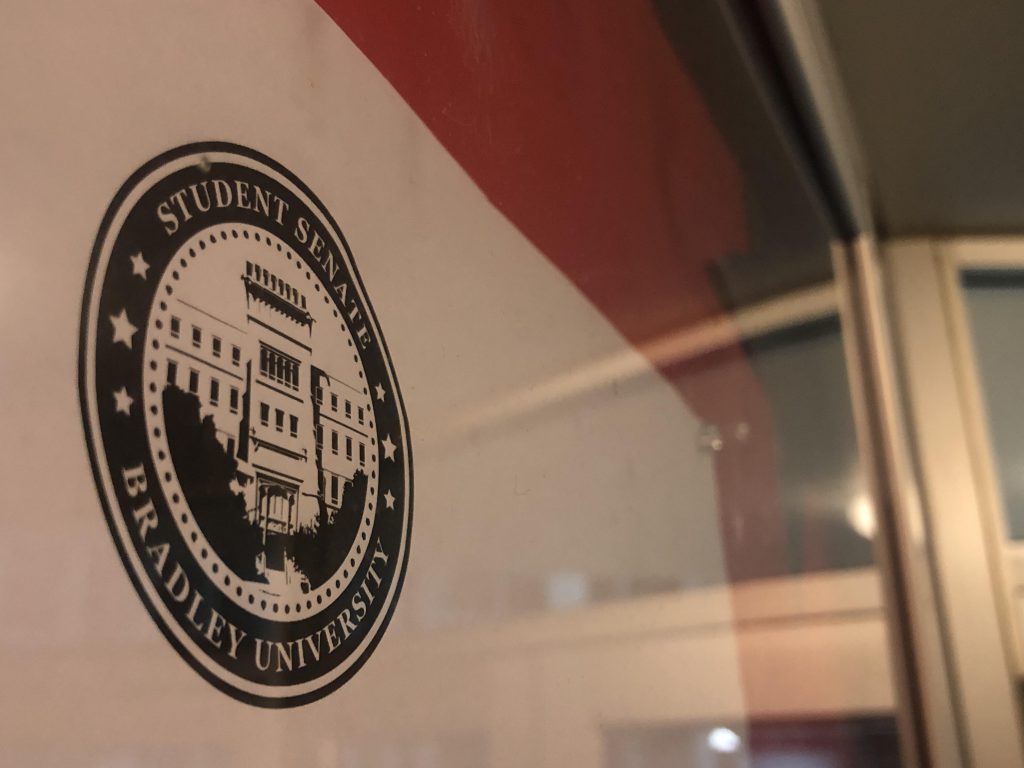
This past Monday, university provost Walter Zakahi spoke before Student Senate in the semester’s last General Assembly meeting.
The meeting occurred several weeks after Zakahi announced that this semester would not use a pass/fail grading system, which students and Student Senate had spent months advocating for through various platforms, including a Change.org petition.
As numerous students were not satisfied with the decision and its communication, Monday’s assembly was an opportunity for students and administration to discuss the decision alongside other pressing student topics. Its virtual setting allowed Bradley students to join through a Zoom link from Student Senate’s social media.
In Zakahi’s opening remarks, he affirmed the decision not to implement pass/fail was the university’s best option. He then voiced beliefs that continuous use of the system would harm students who receive financial aid, citing that approximately 70 percent of Bradley students receive federal aid and approximately 30 percent receive aid directly from Illinois.
Zakahi also stated that, in the face of requests for more information, there was little information he could further divulge.
“We’ve provided the information that we feel we’re in a position to provide at this point,” Zakahi said. “Chances are, I’m gonna end up disappointing you if you’re gonna request more information.”
Those at the meeting sent questions for David Daye, speaker of assembly, to ask Zakahi for a questioning period.
Zakahi turned down the notion that students should make the decision to opt-in or out of pass/fail.
“There are a variety of things where universities make decisions as far as what’s best for the institution and for the students at the institution; this is an example of that,” Zakahi said.
Asked at the meeting, was if student’s well-being was taken into consideration for this semester. Zakahi said that decisions for the institution are also taking into consideration what is best for students.
Zakahi also stated that the provost’s office has not had consistent contact with students as of late, nor did the administration take any pause making a student-based decision without the consultation of any. Echoing his prior statements on the university’s decision-making, he found that risks were too high for the institution to put their confidence in students making informed, independent decisions.
“Universities make these decisions in advance for students on a regular basis,” Zakahi said. “We make decisions, for example, about what the curriculum is for a major … [and for] the Bradley Core Curriculum. We make a lot of decisions for students who attend the university; this is not unusual for us to do that.”
Zakahi also confirmed that the administration is looking at possible substitutes following the cancellation of 2021’s spring break–the end result of a proposal from the administration to the U.S. Department of Education that, in his words, “may have been a short-sighted decision on [their] part.”
Citing university commitments to the federal government, Zakahi refrained from considering the cancellation of five select days’ classes but mentioned current plans for a number of smaller breaks. He also proposed the formation of a spring student panel where experiences of overworking can be shared with faculty, which he believes will help highlight problems such as academic overcompensation.
Before leaving, Zakahi issued a final statement to attendees frustrated with the decisions of Bradley’s senior leadership.
“I get that, and I understand that,” Zakahi said. “All I can tell you is that [at] each and every step, I believe we’ve made decisions that are in the best interest of the students … You may or may not believe me about that, but Bradley’s a place I love, and I’m not gonna do anything to create problems for you or for the institution overall if I can help it.”
Following Zakahi’s departure, student body president Emma Hoyhtya opened the floor for all students to share thoughts.
Some students voiced that they found issues with several of Zakahi’s responses, namely his referring to the proposal for the spring break cancellation as “short-sighted”.
“That tells you that you should involve students in decisions that involve students,” Harini Vasudevanallur Subra, chairperson of campus affairs, said.
Other students voiced worries over the academic ramifications of the administration’s leadership’s decisions.
“They genuinely made choices that not only are gonna hurt students’ mental health but are just gonna cause us to do poorly in school, which will affect our financial aid more,” Karen Fragoso, parliamentarian, said.
Hoyhtya concluded the discourse by making full acknowledgment of the attendees’ continuing enthusiasm.
“I want to have these kinds of conversations far more often,” Hoyhtya said. “I just want us to all stay revved-up angry and just keep screaming these things. […] We are advocating for the things that Senate is talking about, and these things aren’t just getting shouted into a void.”
Hoyhtya maintained that she would be involved in further correspondence with Zakahi and the administration, ending the discussion on a proactive note.
“Things will happen,” Hoyhtya said. “We’re not gonna let them not happen.”




